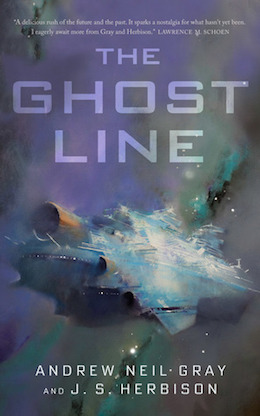The Ghost Line is a peculiar novella, the debut from writing team Andrew Neil Gray and J.S. Herbison. Part space opera, part horror, part reminiscent of James S. A. Corey’s early Expanse novels, it left me unsure how I felt about it. I may be thinking for quite some time.
Husband and wife team Saga and Michel are salvagers and hackers working in the far reaches of the solar system. Saga makes interactive narratives about the old ships and installations that they find. They’re hired by Wei, an odd woman with idiosyncratic priorities, for a job that could solve all their problems—pay for treatments to save Saga’s mother’s life, allow them to settle down and have children, take a holiday from space.
The luxury cruise ship Martian Queen has been mothballed and set to drift back and forth between Earth and Mars, just in case reclaiming it ever became profitable for its owners. Saga and Michel have been employed to help steal it, along with Wei and her alcoholic pilot Gregor. Once they reach the ship, they discover that Wei insists on paranoiac-level precautions: everyone must wear their survival suits, and when they don’t, she locks them out of the ship they came in.
Spoilers.
There’s something strange happening in the Martian Queen. Clothes appear in the wardrobes of staterooms. Projections turn themselves on. The ship feels haunted. Saga dismisses it, looking for a logical explanation (which Michel is happy to provide) until Gregor’s corpse turns up. He’s dead of what looks like a heart attack—in the middle of sexual activity with one of the Martian Queen’s human-like robots. Things don’t get really weird, though, until his corpse wakes back up and hijacks the controls of the ship that brought them to the Martian Queen—destroying it, and ridding them of their only safe way home.
The Martian Queen is being hollowed out from within. An incomprehensible alien lifeform is reconstituting it. In order to try to save her husband’s life, and Wei’s, in order to communicate, Saga takes the alien substance inside herself and is remade as something else.
This is Saga’s story. The Ghost Line follows her closely: her ambivalence about having children, her love for her husband and her work, her growing unease with the Martian Queen. Partway through the novella, she receives word that her mother has died, and we learn that she blames herself for her mother’s illness and now for her death, and that her natural resentment towards her alcoholic father is a looming presence in her emotional landscape. After learning of her mother’s death—at such a remove that she could not even be home until weeks after the funeral—she feels that she has spent her life running away. This drives her necessary self-sacrifice, the self-destruction she undertakes in order to save Michel and Wei.
The Ghost Line is an interesting novella, but not, perhaps a wholly successful one. It sits uneasily in the undefined dimensions between horror (a mood) and space opera (a setting and sometimes also a mood) and though it productively uses this tension between moods, it does so unevenly, and does not handle its reveals entirely successfully. Saga’s characterisation is vividly well done, but Wei, Michel, and Gregor barely make an impression.
All in all, this is a promising first effort, but it didn’t blow me away.
The Ghost Line is available July 11th from Tor.com Publishing.
Liz Bourke is a cranky queer person who reads books. She holds a Ph.D in Classics from Trinity College, Dublin. Her first book, Sleeping With Monsters, a collection of reviews and criticism, is out now from Aqueduct Press. Find her at her blog, where she’s been known to talk about even more books thanks to her Patreon supporters. Or find her at her Twitter. She supports the work of the Irish Refugee Council and the Abortion Rights Campaign










